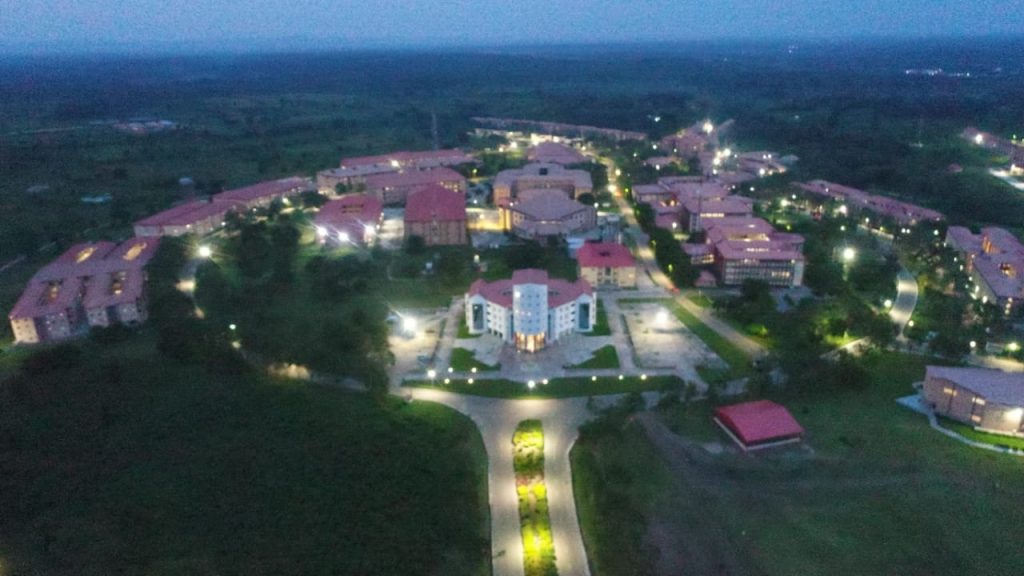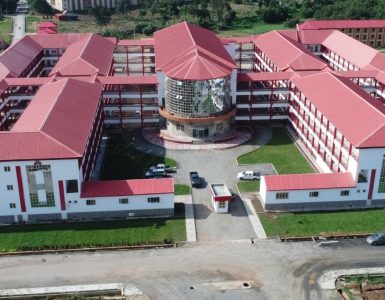In 2024, ABUAD is committed to maintain a remarkable goal of 100% renewable energy already achieved while continuing to increase its renewable energy capacity. This ambitious objective has prompted the university to significantly increase its efforts in the production of biofuels, specifically cassava and sugarcane, at the ABUAD Farm. These initiatives are not merely peripheral activities but are central components of the University Energy Utilities and Sustainability Plan (2020 – 2030) Reviewed 2024. This comprehensive plan is meticulously reviewed and updated on an annual basis to ensure that all strategies implemented are both effective and relevant to the university’s sustainability goals.
In addition to scaling up biofuel production, ABUAD is actively enhancing its divestment strategy, which involves reducing investments in fossil fuels and rechanneling resources into sustainable alternatives. This strategy is crucial for aligning the university’s financial practices with its environmental objectives. Furthermore, ABUAD is strengthening its collaboration with the International Institute of Tropical Agriculture (IITA) and engaging in fruitful partnerships with esteemed organizations in Japan. These collaborations focus on advancing cassava production techniques, ultimately promoting a sustainable and eco-friendly future. Through these concerted efforts, ABUAD is not only positioning itself as a leader in renewable energy but also as a model for other institutions striving for sustainability. The partnership reads thus
In 2024, the Japanese Embassy in Nigeria has agreed to join efforts with IITA and the Afe Babalola University Ado Ekiti (ABUAD) to help farmers. To demonstrate their commitment, the three institutions signed a memorandum of understanding to improve cassava production and processing for Agbekoya farmers in Ekiti state.
Specifically, IITA will provide the Ekiti State Chapter of Agbekoya Farmers Association, with 600 bundles of improved cassava cuttings. In addition, IITA will provide 30 Agbekoya farmers with training in the use of cassava processing machines and 10 Agbekoya farmers on the maintenance of cassava processing machines.
The Japanese Embassy, on the other hand, will provide two cassava processing centers for the farmers while ABUAD would provide monitoring/ training services.
At the signing of the agreement in Ibadan on Monday, Dr Kenton Dashiell, IITA Deputy Director General (Partnerships & Capacity Development), expressed optimism that the collaboration would contribute to improve the livelihoods of cassava farmers, especially women and youth who play a pivotal role in cassava processing.
Dr Dashiell noted that the development of cassava along the value chain is critical for Africa to unleash the potential of the root crop.
“To make cassava work for the poor, we need to produce and also process it into products such as biofuel, gari, fufu, high quality cassava flour, etc. We believe that value addition through processing is an important aspect for us to advance the potential of cassava,” Dr Dashiell said.
According to him, the project in Ekiti will contribute in several ways: it will create jobs, improve incomes, open new markets for farmers, and improve the Nigerian economy.
The Ambassador, Embassy of Japan in Nigeria, His Excellency Mr. Ryuichi Shoji said that the provision of cassava processing centers with the collaboration of farmers was part of efforts to support the Agricultural Transformation Agenda of the Nigerian government. He also thanked IITA for its contribution to ensuring the success of the project, adding that the project would alleviate poverty and enhance food security.
The President General of the Agbekoya Farmers, Kamorudeen Aremu Okikiola, commended IITA, the Japanese Embassy, and ABUAD for their support to farmers. He called on other development and research organizations in Nigeria to emulate the intervention.
Prof Smaranda Olarinde, Vice Chancellor of ABUAD, called on the farmers to actively participate in the project and to ensure that the efforts by IITA, ABUAD, and the Japanese Embassy do not go in vain.
https://venturesafrica.com/japan-iita-abuad-partner-to-improve-cassava-production
Energy Waste Management through Detailed Energy Audits
In 2024, the University has proactively established a comprehensive framework of energy audits and extensive research studies aimed at improving energy efficiency across its campus. These initiatives are not merely procedural; they serve as essential tools guiding the implementation of the well-structured Energy and Utility Sustainability Master Plan, which was meticulously reviewed and updated in 2024 to align with current sustainability goals.
As part of this ongoing commitment to sustainability, the Directorate of Works and Maintenance Services performs thorough quarterly energy audits and detailed energy profile assessments throughout the year 2024. Each audit involves a systematic examination of a variety of campus buildings, including classrooms, laboratories, and residential facilities. The director and his skilled team analyze energy usage across different time frames and conditions, relying on historical data to identify patterns and trends that emerge in energy consumption on a weekly basis.
To facilitate this analysis, the team creates comprehensive plots and charts of energy usage data, highlighting both normal and peak consumption periods. By closely examining these graphical representations, they can discern the specific times when energy demand is highest and, conversely, when it dips during off-peak hours.
One of the key objectives of this rigorous analysis is to determine the percentage of energy consumed during these off-peak periods. This information is vital, as it allows the team to calculate the level of energy waste incurred when buildings are still consuming power but not in use, such as late at night or on weekends. With these insights, the University can implement targeted strategies to reduce energy waste, such as optimizing heating and cooling systems, introducing smart building technologies, and encouraging energy-saving behaviors among faculty, staff, and students.
Ultimately, through these detailed energy audits and proactive management strategies, the University aims not only to foster a culture of energy awareness and responsibility but also to achieve significant reductions in energy consumption, contributing to its broader sustainability objectives and minimizing its environmental footprint.

Energy Audit and Reliability Analysis of Afe Babalola University Power Distribution System
https://www.igi-global.com/chapter/energy-audit-and-reliability-analysis-of-afe-babalola-university-power-distribution-system/256676
https://portal.abuad.edu.ng/Assignments/1620755175AKPAN_ASS.pdf
















Add comment